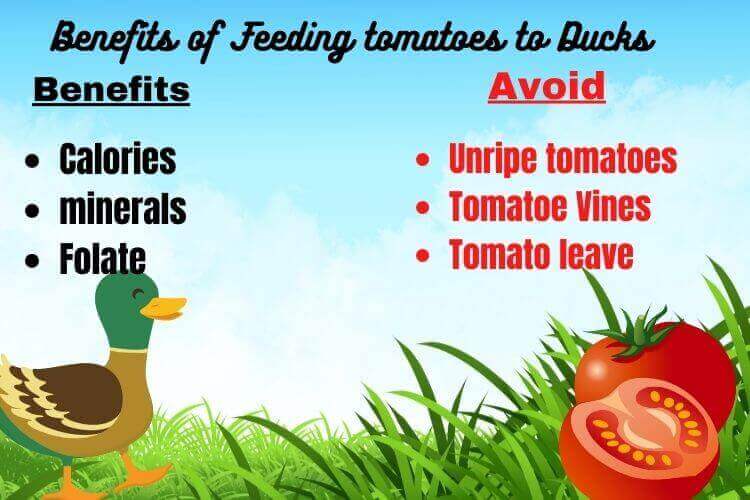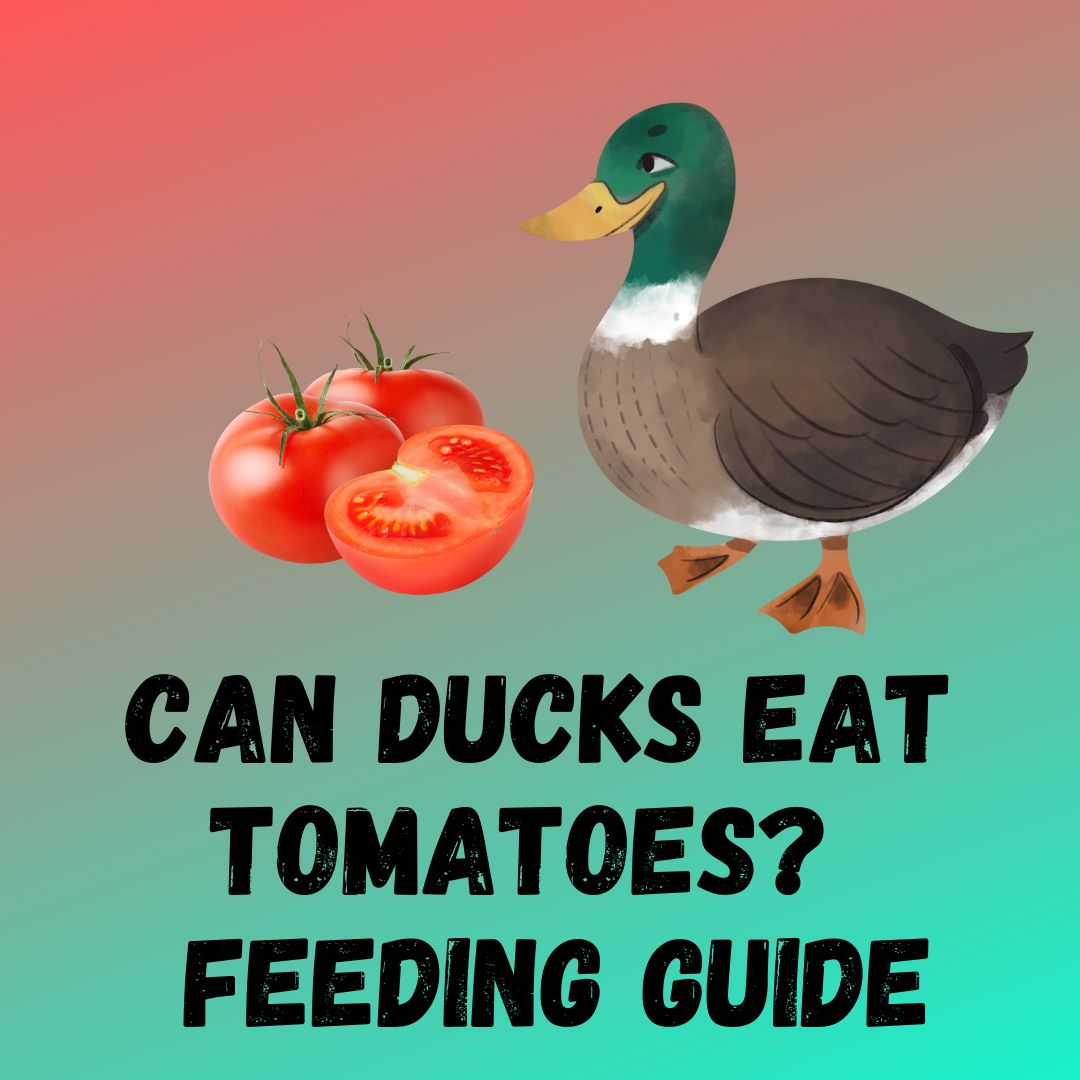When feeding ducks, knowledge of which foods are safe and which foods may harm them is crucial. Unsafe food may not only compromise the egg-laying capacity and proper growth of ducks, but it can also lead to the untimely death of the ducks – particularly with poisonous food. The tomato is one of those foods that is tricky and should be understood well.
Post Contents
Can ducks eat tomatoes?
Ducks can eat ripe tomatoes safely with no adverse effects with cherry and grape tomatoes being a delicacy for ducks. However, just like other plants in the nightshade plant family, tomato plant leaves and vines or unripe/green tomatoes contain toxins known as tomatine harmful to ducks.
Benefits of feeding tomatoes to ducks
Tomatoes contain the following nutrients that are needed by ducks.
1. Calories
Megan Ware, Registered Dietician Nutritionist, tells us that one cup of chopped raw tomatoes contains 32 calories (kcal).
Calories are important in ducks as important sources of energy. This energy is crucial in the generation of heat in a duck’s body.
2. Calcium and Phosphorus
Megan also mentions that one cup of chopped raw tomatoes has about 18mg of calcium and 43 mg of potassium.
For instance, calcium is used to make good solid eggshells in ducks’ eggs (calcium carbonate – created out of calcium – comprises 96% of the eggshell).
Elsewhere, both calcium and Phosphorus are converted to hydroxyapatite to make 60 – 70% of the bone weight in ducks.
3. Folic acid
Folic acid is among the several nutrients and antioxidants in tomatoes. Experts recommend that duck diets be supplemented with folic acid content.
Why? Because folic acid leads to better quality eggs and normal growth rates among ducks. For instance, folic acid enables ducks to lay eggs that are rich in folate – this folate substance helps human beings avoid many ailments.
These represent a sample of the nutritional value of tomatoes. More than that, tomatoes are delicious food for ducks.
They love cherry tomatoes especially. But serve with moderation, they should be provided as treats once in a while.

Fun fact: Tomatoes are superfoods for humans. Scientists mention that they can provide some protection against cancer, maintain healthy blood pressure, and decrease blood glucose for those living with diabetes.
Risks associated with feeding tomatoes to ducks
Generally, tomatoes, considered a fruit, in this case, is said to be harmless to both humans and poultry.
Hence, feeding the tomato fruit to your ducks is not a problem. The troubling area comes about when the tomato plant is considered –vines, leaves, and even unripe fruit.
Since the tomato plant is a member of the nightshade family, there are concerns over the toxicity that is in the plant itself – vines and leaves.
Other plants in the nightshade family include eggplants, potatoes, and the nightshade itself – these are also no-go-zones for ducks.
Fun fact: Because tomatoes have long been known to be a part of the nightshade family, controversy has plagued the tomato plant. People in medieval times believed that tomatoes were used in witchcraft, and then others believed that tomatoes were used as an aphrodisiac. This ‘charm’ of the tomato – if you can call it that – led to it being avoided as a food crop for a long time. But times have changed and apart from the debate over whether it is a fruit or a veggie, I don’t think you’ll find superstition associated with tomatoes.
Why feed the tomato fruit but not the leaves and vines?
Members of the nightshade family have one thing in common – they all produce alkaloids – really harmful chemicals – that can poison people and animals.
However, scientists tell us that tomatoes provide a different alkaloid as opposed to its ‘relatives’: tomatine.
Tomatine is highly concentrated in stems, leaves, and the unripe fruits of tomatoes. For this reason, leaves, stems, and unripe/green tomatoes are not recommended for ducks.
Granted, tomatine is not as toxic as the other alkaloids produced by other members of the nightshade family.
If ingested in small doses, you may get away with a stomach upset. However, in large doses, tomatine causes gastrointestinal problems and damage to major human organs such as the liver and the heart.
We’re talking duck physiology here, I know, but since human beings have a more sophisticated digestive system than ducks, tomatine may cause far harsher complications.
In fact, all animals, in general, will suffer harsher effects on ingesting tomatine. For instance, tomatine causes harm to dogs’ nervous systems as well as digestive complications.
Therefore, even though some may claim that their ducks ate tomato leaves and did not suffer as a result, I think it is best not to skate the thin line between tomatine that will fatally harm your ducks and that which will only produce mild effects.
Important: Ducks that run to the garden to feast on tomatoes by themselves are in danger of poisoning. Tomato leaves are said to have a distinctive pungent smell and have their surfaces covered with prickly hairs – these two characteristics make the leaves unpalatable to most animals. However, young ducklings and even adults may still get a bite of the tomato vines which have toxins. Hence, it is important to keep an eye out for ducks whenever they venture into a tomato garden.
How to feed tomatoes to ducks
- When it comes to feeding tomatoes to ducks, it’s best to slice the tomatoes into small chunks or by half. Not only will it help the ducks to consume the tomatoes, but it will also allow you an opportunity to check that the tomatoes are of good quality.
Spoiled or moldy potatoes can be harmful to your ducks because mold spores compromise ducks’ respiratory systems.
- You can mix the tomatoes with other food to make a colorful, delicious mix. I have read a comment somewhere that certain ducks “won’t eat anything red.” I think mixing different colors of food may help with that. For instance, kale and tomatoes.
- If you’re feeding tomatoes to your ducks for the first time, serve a little to see if they’ll take. If they do, observe their waste afterward for signs of any digestive effects. You’ll likely find none but still, best to make sure.
FAQ
Can baby ducks eat tomatoes?
Yes, baby ducks can eat tomatoes. Both cherry and grape tomatoes are good for baby ducks. However, baby ducks should never be fed unripe tomatoes and the leaves and stem of a tomato plant because these are toxic.
Can ducks eat cherry tomatoes?
Yes, ducks can eat cherry tomatoes. Cherry tomatoes are a delicacy for ducks and, for that reason, halved cherry tomatoes are usually used as a way of feeding medication to ducks when they need it. But cherry tomatoes should be served as treats once in a while.
What veggies can duck eat?
Ducks eat a wide variety of veggies such as cucumber, peas, beans, kale, cabbage, broccoli, and corn. In addition, the duck enjoys weeds and herbs such as oregano, rosemary, basil, mint, parsley, and calendula. They can also eat luscious greens and fruits (tomatoes, grapes, berries, bananas, and cantaloupe).
Final Thoughts
Ducks can eat tomatoes and they seem to enjoy every minute of it. Cherry tomatoes are a favorite. However, since tomatoes are part of the nightshade family, tomato leaves, stems, and green/unripe tomatoes are not good for ducks. These parts contain toxins that could harm your ducks. So, keep them out of their diet and ensure that your ducks don’t wander off to get a bite in the tomato garden when you’re not looking.
So, if you’ve heard concerns about feeding tomatoes to your ducks, there’s simply no reason to worry if you just feed ripe, fresh, juicy tomatoes – cherry or grape, or other varieties. Your ducks will love it and, more importantly, they will get essential nutritional value.

94% of pet owners say their animal pal makes them smile more than once a day. In 2007, I realized that I was made for saving Animals. My father is a Vet, and I think every pet deserves one. I started this blog, “InPetCare”, in 2019 with my father to enlighten a wider audience.
